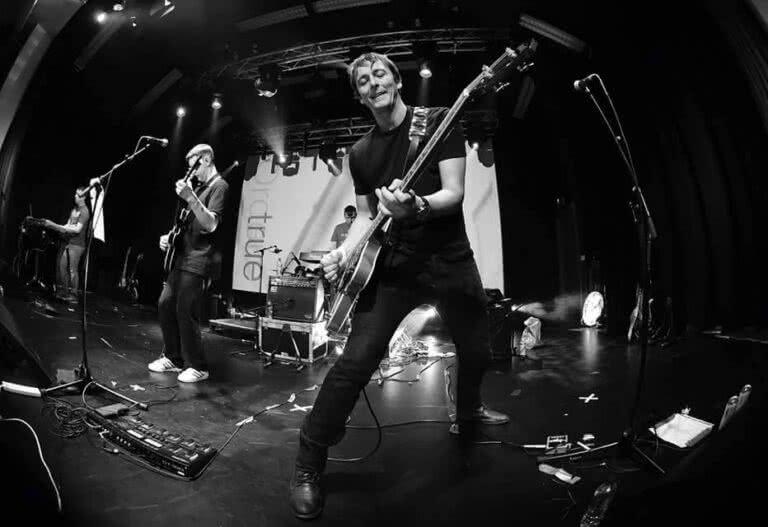This is a guest post by Kyle MacNeill, a music and culture writer. Find him in London or Birmingham shouting about how much he loves Burial.
In the past, tribute bands’ names were positioned on event flyers with the kind of small print that required two pairs of glasses. It’s a different (and more exciting) story, now.
In recent years, there’s been a surge in events with tribute bands at the helm. No longer the tepid warm-up acts for ‘real bands’, they’re now hot stuff: and can make tickets fly like even hotter hotcakes. We spoke to industry experts and the biggest tribute bands to find out more:
‘Ex’ sells
Anything ‘ex’, be it old, retro, or nostalgic, sells well. It’s something that A Special Kind of Madness – a Specials and Madness mash-up tribute band – know well. “That’s a big point in our market, we are giving people that nostalgia trip,” says Mike, the band’s keyboardist.
Giving people a blast from their past can be powerfully evocative. Mike agrees: “They say it’s like going back to my teenage years, revisiting my youth. That’s what people love at the moment, certainly for our audience. It’s not just about the music it’s bringing back the whole experience – and the dressing up!”
Although in the past the biggest tribute acts were the oldest – be it bogus Beatles, synthetic Stones or ersatz Eagles – nostalgia moves with the times, literally. Clare, head of marketing at Alive Network Entertainment Agency explains: “Tributes to iconic artists like The Beatles, ABBA and Michael Jackson are always popular with clients. But the trends we’re seeing at the moment are around an increasing demand for ‘90s and ‘00s artists because that’s where we are, generationally.”
Hitting the sweet spot of booking a tribute act who are newly nostalgic, then, seems the key.
It’s much less costly
With venue closures increasing and tickets becoming pricier, it’s difficult times for both consumers and businesses. Tribute bands, however, can be used to create strong events at a fraction of the costs of others.
Take On Take That (take one guess at who this crowd emulate…) explain: “Obviously some people can’t afford to pay £90 or £100 for tickets to see ‘the real thing’ or aren’t necessarily willing to travel.” J’Adele – no guesses, again – agrees: “I think tribute bands are popular because they give people a chance to hear their favourite music live without the ticket cost and travel expense of getting to the big venues.”
As well as being considerably cheaper for consumers, investing in a tribute act is also cost-efficient for both event organisers and venue owners too. It enables the staging of a lucrative, sell-out event without huge booking fees and prices. Tribute bands are also a lot less ‘costly’ in terms of risk factor. Booking mid-sized, new bands could prove risky, but tribute bands can be a safe cash-cow with a guaranteed following.
Almost all of the major tribute bands on the circuit started out with their own material, before finding more success doing covers. “We had our own band doing our own material. The turning point was when we did a free festival. The band have a soft spot for New Order and that particular day we did half an hour of our own stuff and the last half an hour of just New Order tracks.”
Did it work? You bet: “Some of my friends couldn’t actually get into the building, because word got around that we were doing the New Order Stuff.”
Even better than the real thing?
…Steve Jordan from Scott Jordan Entertainment Agency seems to think so: “The main comment or feedback we get from organisers is that this is the closest they could possibly get to the real thing at their event. Also, chances are they would never get the original act at their event.”
They shouldn’t, however, be seen as cheap knock-offs. In fact, the best tribute acts are ones that transcend the original. Bands such as True Order, are not affected by any of the band splits or feuds in New Order, meaning it’s the only way to see the ‘original’ line-up. Tribute bands allow punters to see acts that, often, aren’t actually possible to see live anymore.
The most successful new tribute band at the moment are providing something that never existed. They are Elvana – yes, a Nirvana tribute band fronted by an Elvis tribute – and they have recently toured the USA and sold out 2000 capacity venues in the UK’s biggest cities. It’s fair to say their UK manager – chief booker at Newcastle’s O2 Academy, Phil Beevers – is excited: “In my fifteen years in the industry, I have never seen crowds go as wild for a tribute act.”
Conclusion
With opinions on tribute bands rapidly changing from negative to giddily positive, it seems that this is the time to consider booking them. Providing a nostalgia trip at a fraction of the “real thing” cost – and making it possible for punters to see acts no longer around – the good tribute acts quickly build-up fan bases and repeat ticket sales. Trends come and go, of course – but at the present, at least – the future of music events seems to be all about the past.





